| |
|
|---|
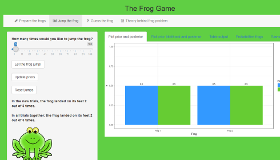 Bayesian statistics - the frog example - an extended version of a student app: An introduction to Bayesian statistics
Bayesian statistics - the frog example - an extended version of a student app: An introduction to Bayesian statistics
|
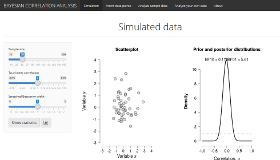 Bayesian Correlation Analysis: The "Bayesian correlation analysis" app shows how the results of Bayesian procedures vary in the light of changes regarding data and prior beliefs.
Bayesian Correlation Analysis: The "Bayesian correlation analysis" app shows how the results of Bayesian procedures vary in the light of changes regarding data and prior beliefs.
| 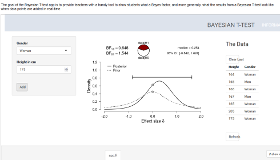 Bayesian t-Test Teaching App: The goal of the Bayesian t-test app is to provide teachers with a handy tool to show students what a Bayes factor, and more generally, what the results from a Bayesian t-test look like when data points are added in real-time. Bayesian t-Test Teaching App: The goal of the Bayesian t-test app is to provide teachers with a handy tool to show students what a Bayes factor, and more generally, what the results from a Bayesian t-test look like when data points are added in real-time. |
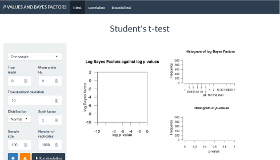 P-values & Bayes factors: This app illustrates the relation between p values and Bayes factors for various widely-used statistical tests of hypotheses. P-values & Bayes factors: This app illustrates the relation between p values and Bayes factors for various widely-used statistical tests of hypotheses.
|
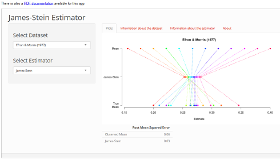 James-Stein estimator: The goal of this shiny app is to visualize the effect of shrinkage estimators and compare their performance to other estimators. James-Stein estimator: The goal of this shiny app is to visualize the effect of shrinkage estimators and compare their performance to other estimators. |
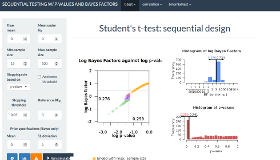 Sequential testing with p-values and Bayes factors This app illustrates the relation between p-values and Bayes factors for various statistical tests under sequential and block sampling procedures. Sequential testing with p-values and Bayes factors This app illustrates the relation between p-values and Bayes factors for various statistical tests under sequential and block sampling procedures.
|
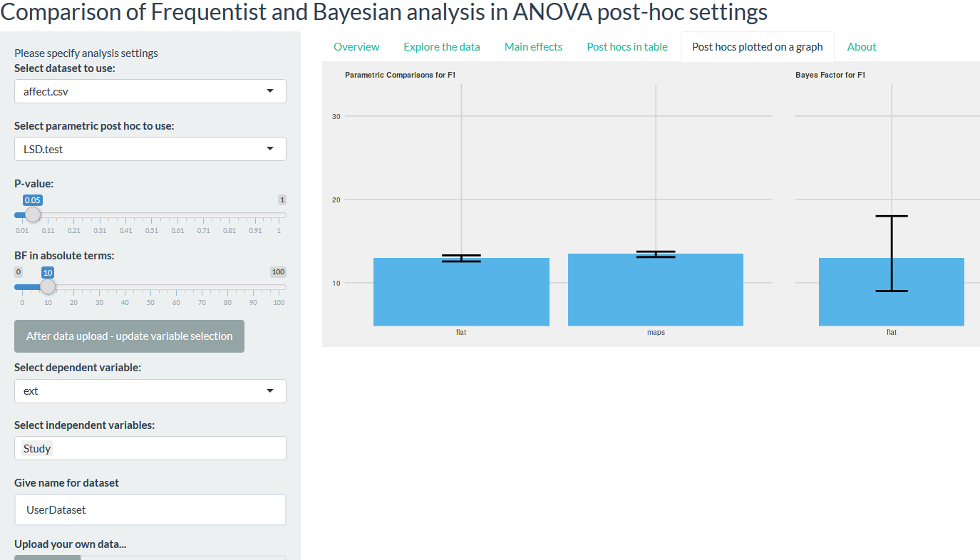 Comparison
of Frequentist and Bayesian analysis in ANOVA post-hoc settings: The aim of the app is to give students and researchers a
tool to balance experimental groups before starting an experiment. Comparison
of Frequentist and Bayesian analysis in ANOVA post-hoc settings: The aim of the app is to give students and researchers a
tool to balance experimental groups before starting an experiment.
|
| |
|
|---|
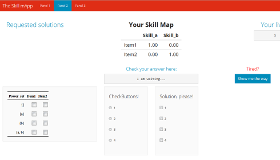 The Skill mApp aims to provide a first contact with both the Knowledge Space Theory and the skill map theory. The Skill mApp aims to provide a first contact with both the Knowledge Space Theory and the skill map theory. |
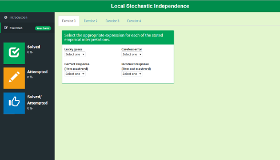 Local independence: This app exemplifies the local independence assumption of the basic local independence model. Local independence: This app exemplifies the local independence assumption of the basic local independence model. |
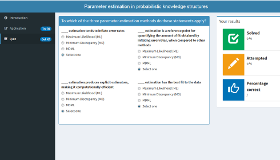 Parameter estimation: This app uses three procedures to estimate the parameters for a data set and a knowledge structure specified by the user. Parameter estimation: This app uses three procedures to estimate the parameters for a data set and a knowledge structure specified by the user. |
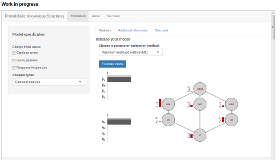 Classical and Bayesian parameter estimation: This app demonstrates classical and Bayesian parameter estimation methods for probabilistic knowledge structures. Classical and Bayesian parameter estimation: This app demonstrates classical and Bayesian parameter estimation methods for probabilistic knowledge structures.
|
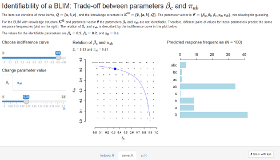 Identifiability: This app visualizes the trade-off between the parameters of a non-identifiable basic local independence model (BLIM). Identifiability: This app visualizes the trade-off between the parameters of a non-identifiable basic local independence model (BLIM).
|
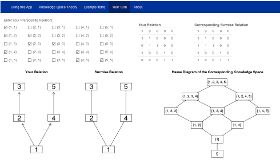 Surmise Relations: This app demonstrates surmise relations and the corresponding knowledge spaces. Surmise Relations: This app demonstrates surmise relations and the corresponding knowledge spaces.
|
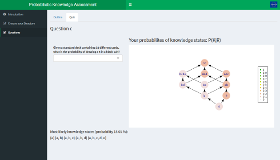 Probabilistic Knowledge Assessment: This app lets you build your own knowledge structure on a set
of five items on elementary probability theory, and lets you perform a probabilistic knowledge assessment on that
structure. Especially the UI is based on a students' app. Probabilistic Knowledge Assessment: This app lets you build your own knowledge structure on a set
of five items on elementary probability theory, and lets you perform a probabilistic knowledge assessment on that
structure. Especially the UI is based on a students' app.
|
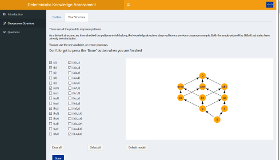 Deterministic Knowledge Assessment: This app lets you build your own knowledge structure on a set of five items on elementary probability theory, and lets you perform a deterministic knowledge assessment on that structure. It is derived from the
app on probabilistic knowledge assessment. Deterministic Knowledge Assessment: This app lets you build your own knowledge structure on a set of five items on elementary probability theory, and lets you perform a deterministic knowledge assessment on that structure. It is derived from the
app on probabilistic knowledge assessment.
|
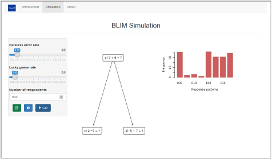 BLIM simulation: This app lets you simulate response patterns based on a given knowledge space using the BLIM.
BLIM simulation: This app lets you simulate response patterns based on a given knowledge space using the BLIM.
|
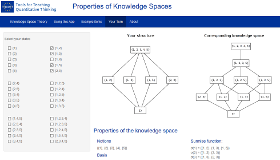 Properties of Knowledge Spaces: This app lets you enter a knowledge structure and shows various properties of the
corresponding knowledge space.
Properties of Knowledge Spaces: This app lets you enter a knowledge structure and shows various properties of the
corresponding knowledge space.
|
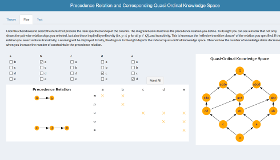 Precedence Relation and Corresponding Quasi-Ordinal Knowledge Space: This app illustrates the one-to-one correspondence
between a precedence relation among a number of problems and a quasi-ordinal knowledge space.
Precedence Relation and Corresponding Quasi-Ordinal Knowledge Space: This app illustrates the one-to-one correspondence
between a precedence relation among a number of problems and a quasi-ordinal knowledge space.
|
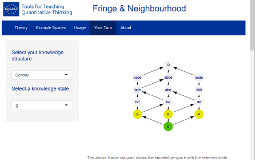 Fringe & Neighbourhood: This app illustrates the fringe
and neighbourhood of knowledge states.
Fringe & Neighbourhood: This app illustrates the fringe
and neighbourhood of knowledge states.
|
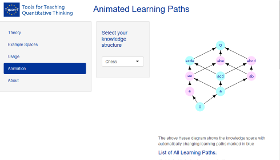 Animated Learning Paths: This app illustrates learning paths in a knowledge structure.
Animated Learning Paths: This app illustrates learning paths in a knowledge structure.
|
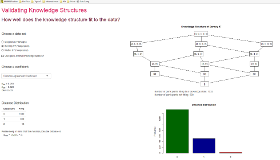 Validating Knowledge Structures: This app applies several validation coefficients to a selection of knowledge structures and respective data. It is based on a student app developed at the 2018 TquanT seminar in Glasgow.
Validating Knowledge Structures: This app applies several validation coefficients to a selection of knowledge structures and respective data. It is based on a student app developed at the 2018 TquanT seminar in Glasgow.
|
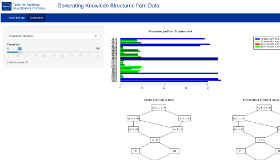 Generating Knowledge Structures: This app illustrates a simple approach to generating knowledge structures from response patterns.
Generating Knowledge Structures: This app illustrates a simple approach to generating knowledge structures from response patterns.
|
 Inductive Item Tree Analysis (IITA): This app illustrates the use of IITA to generate surmise relations from data.
Inductive Item Tree Analysis (IITA): This app illustrates the use of IITA to generate surmise relations from data.
|
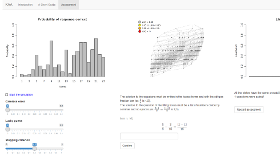 The Knowledge Assessment
App aims to give a demonstration of how the adaptive assessment of knowledge developed within the Knowledge
Space Theory (KST) framework works in practice. The Knowledge Assessment
App aims to give a demonstration of how the adaptive assessment of knowledge developed within the Knowledge
Space Theory (KST) framework works in practice.
|
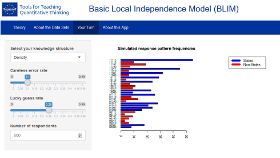 Simulating BLIM: This app illustrates the application of the BLIM model to simulating response patterns from a
knowledge structure.
Simulating BLIM: This app illustrates the application of the BLIM model to simulating response patterns from a
knowledge structure.
|
| |
|
|---|
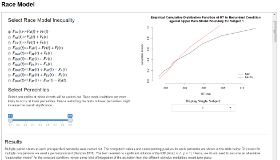 Race Model: An app introducing and illustrating the race model for multisensory signals. Race Model: An app introducing and illustrating the race model for multisensory signals.
|
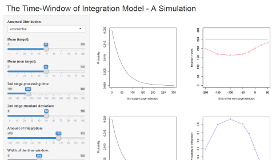 TWIN: Time Window of Multisensory INtegration. TWIN: Time Window of Multisensory INtegration.
|
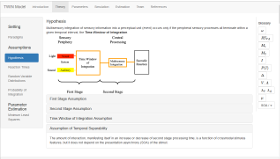 TWIN 2017: A Shiny App for visualizing, simulating and estimating the Time-Window of INtegration (TWIN) model (version 2017). TWIN 2017: A Shiny App for visualizing, simulating and estimating the Time-Window of INtegration (TWIN) model (version 2017).
|
| |
|
|---|
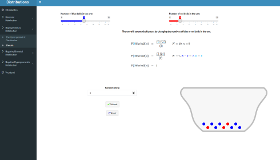 Urn
Problems: This app illustrates discrete distributions via the urn model. It is based on a
learnr tutorial developed by students at the 2018 TquanT seminar in Glasgow. Urn
Problems: This app illustrates discrete distributions via the urn model. It is based on a
learnr tutorial developed by students at the 2018 TquanT seminar in Glasgow.
|
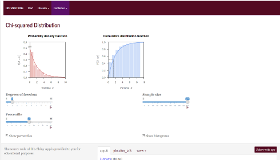 Probability Distributions: This app allows a user to explore
many different probability distributions in an interactive manner. It is based
on a student app from the
TquanT Seminar 2018 in Glasgow.
Probability Distributions: This app allows a user to explore
many different probability distributions in an interactive manner. It is based
on a student app from the
TquanT Seminar 2018 in Glasgow.
|
| |
|
|---|
| With this app you can explore basic statistics concepts, compare different models and see how they all boil
down to the same recipe: Data = model + error |
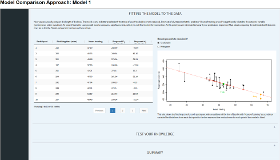 Model
Comparison Approach, Model 1: Model 1 uses one metric independent variable and a metric dependent variable and offers a
basic introduction of the model comparison approach and an introduction to model comparison using linear regressions
and correlations. Model
Comparison Approach, Model 1: Model 1 uses one metric independent variable and a metric dependent variable and offers a
basic introduction of the model comparison approach and an introduction to model comparison using linear regressions
and correlations.
|
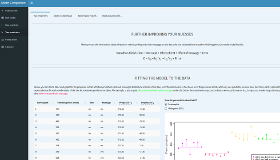 Model
Comparison Approach, Model 2: Model 2 uses one categorical independent variable and a metric dependent variable and
offers a more advanced discussion using linear regressions with dummies, t-test, and factorial ANOVA. Model
Comparison Approach, Model 2: Model 2 uses one categorical independent variable and a metric dependent variable and
offers a more advanced discussion using linear regressions with dummies, t-test, and factorial ANOVA.
|
| |
|
|---|
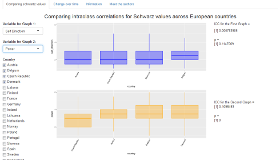 Comparing
Intraclass Correlations for Schwarz Values across European Countries. Comparing
Intraclass Correlations for Schwarz Values across European Countries.
|
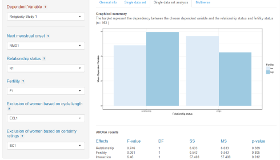 Multiverse
analysis: This app shows how different choices in constructing the data leads to different analysis results. Multiverse
analysis: This app shows how different choices in constructing the data leads to different analysis results.
|
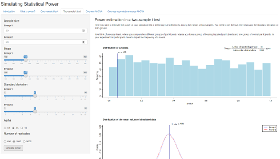 Simulating
Statistical Power: This app illustrates the concept of statistical power by simulation. It is based on a
student app developed at the 2018 TquanT seminar in Glasgow. Simulating
Statistical Power: This app illustrates the concept of statistical power by simulation. It is based on a
student app developed at the 2018 TquanT seminar in Glasgow.
|
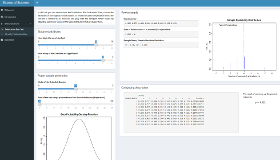 Excess
of Success: This app illustrates how to test for too many successful replications in a series of replication studies. Excess
of Success: This app illustrates how to test for too many successful replications in a series of replication studies.
|
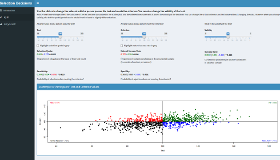 Selection Decisions: This app illustrates the effects of several factors on the validity of selection decisions,
and how these factors influence each other.
Selection Decisions: This app illustrates the effects of several factors on the validity of selection decisions,
and how these factors influence each other.
|
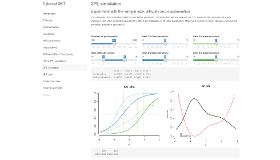 Tutorial on Item Response Theory (IRT) This learnr tutorial is based on a tutorial
developed by students at the TquanT 2018 Seminar in Glasgow.
Tutorial on Item Response Theory (IRT) This learnr tutorial is based on a tutorial
developed by students at the TquanT 2018 Seminar in Glasgow.
|
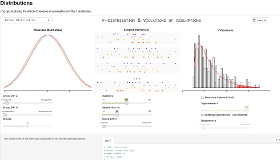 Distributions:
This app illustrates the effect of violations of assumptions for the F distribution. Distributions:
This app illustrates the effect of violations of assumptions for the F distribution.
|
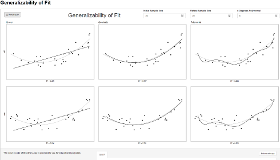 Generalizability of Fit:
An illustration of the concept of generalizability of a fitted statistical model. Generalizability of Fit:
An illustration of the concept of generalizability of a fitted statistical model.
|
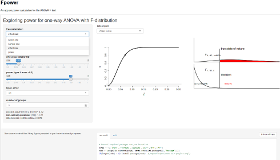 Fpower:
An app on power calculation for the ANOVA F test. Fpower:
An app on power calculation for the ANOVA F test.
|
 Bayesian statistics - the frog example - an extended version of a student app: An introduction to Bayesian statistics
Bayesian statistics - the frog example - an extended version of a student app: An introduction to Bayesian statistics
 Bayesian Correlation Analysis: The "Bayesian correlation analysis" app shows how the results of Bayesian procedures vary in the light of changes regarding data and prior beliefs.
Bayesian Correlation Analysis: The "Bayesian correlation analysis" app shows how the results of Bayesian procedures vary in the light of changes regarding data and prior beliefs.
 Bayesian t-Test Teaching App: The goal of the Bayesian t-test app is to provide teachers with a handy tool to show students what a Bayes factor, and more generally, what the results from a Bayesian t-test look like when data points are added in real-time.
Bayesian t-Test Teaching App: The goal of the Bayesian t-test app is to provide teachers with a handy tool to show students what a Bayes factor, and more generally, what the results from a Bayesian t-test look like when data points are added in real-time. P-values & Bayes factors: This app illustrates the relation between p values and Bayes factors for various widely-used statistical tests of hypotheses.
P-values & Bayes factors: This app illustrates the relation between p values and Bayes factors for various widely-used statistical tests of hypotheses.
 James-Stein estimator: The goal of this shiny app is to visualize the effect of shrinkage estimators and compare their performance to other estimators.
James-Stein estimator: The goal of this shiny app is to visualize the effect of shrinkage estimators and compare their performance to other estimators. Sequential testing with p-values and Bayes factors This app illustrates the relation between p-values and Bayes factors for various statistical tests under sequential and block sampling procedures.
Sequential testing with p-values and Bayes factors This app illustrates the relation between p-values and Bayes factors for various statistical tests under sequential and block sampling procedures.
 Comparison
of Frequentist and Bayesian analysis in ANOVA post-hoc settings: The aim of the app is to give students and researchers a
tool to balance experimental groups before starting an experiment.
Comparison
of Frequentist and Bayesian analysis in ANOVA post-hoc settings: The aim of the app is to give students and researchers a
tool to balance experimental groups before starting an experiment.
 The Skill mApp aims to provide a first contact with both the Knowledge Space Theory and the skill map theory.
The Skill mApp aims to provide a first contact with both the Knowledge Space Theory and the skill map theory. Local independence: This app exemplifies the local independence assumption of the basic local independence model.
Local independence: This app exemplifies the local independence assumption of the basic local independence model. Parameter estimation: This app uses three procedures to estimate the parameters for a data set and a knowledge structure specified by the user.
Parameter estimation: This app uses three procedures to estimate the parameters for a data set and a knowledge structure specified by the user. Classical and Bayesian parameter estimation: This app demonstrates classical and Bayesian parameter estimation methods for probabilistic knowledge structures.
Classical and Bayesian parameter estimation: This app demonstrates classical and Bayesian parameter estimation methods for probabilistic knowledge structures.
 Identifiability: This app visualizes the trade-off between the parameters of a non-identifiable basic local independence model (BLIM).
Identifiability: This app visualizes the trade-off between the parameters of a non-identifiable basic local independence model (BLIM).
 Surmise Relations: This app demonstrates surmise relations and the corresponding knowledge spaces.
Surmise Relations: This app demonstrates surmise relations and the corresponding knowledge spaces.
 Probabilistic Knowledge Assessment: This app lets you build your own knowledge structure on a set
of five items on elementary probability theory, and lets you perform a probabilistic knowledge assessment on that
structure. Especially the UI is based on a students' app.
Probabilistic Knowledge Assessment: This app lets you build your own knowledge structure on a set
of five items on elementary probability theory, and lets you perform a probabilistic knowledge assessment on that
structure. Especially the UI is based on a students' app.
 Deterministic Knowledge Assessment: This app lets you build your own knowledge structure on a set of five items on elementary probability theory, and lets you perform a deterministic knowledge assessment on that structure. It is derived from the
app on probabilistic knowledge assessment.
Deterministic Knowledge Assessment: This app lets you build your own knowledge structure on a set of five items on elementary probability theory, and lets you perform a deterministic knowledge assessment on that structure. It is derived from the
app on probabilistic knowledge assessment.
 BLIM simulation: This app lets you simulate response patterns based on a given knowledge space using the BLIM.
BLIM simulation: This app lets you simulate response patterns based on a given knowledge space using the BLIM.
 Properties of Knowledge Spaces: This app lets you enter a knowledge structure and shows various properties of the
corresponding knowledge space.
Properties of Knowledge Spaces: This app lets you enter a knowledge structure and shows various properties of the
corresponding knowledge space.
 Precedence Relation and Corresponding Quasi-Ordinal Knowledge Space: This app illustrates the one-to-one correspondence
between a precedence relation among a number of problems and a quasi-ordinal knowledge space.
Precedence Relation and Corresponding Quasi-Ordinal Knowledge Space: This app illustrates the one-to-one correspondence
between a precedence relation among a number of problems and a quasi-ordinal knowledge space.
 Fringe & Neighbourhood: This app illustrates the fringe
and neighbourhood of knowledge states.
Fringe & Neighbourhood: This app illustrates the fringe
and neighbourhood of knowledge states.
 Animated Learning Paths: This app illustrates learning paths in a knowledge structure.
Animated Learning Paths: This app illustrates learning paths in a knowledge structure.
 Validating Knowledge Structures: This app applies several validation coefficients to a selection of knowledge structures and respective data. It is based on a student app developed at the 2018 TquanT seminar in Glasgow.
Validating Knowledge Structures: This app applies several validation coefficients to a selection of knowledge structures and respective data. It is based on a student app developed at the 2018 TquanT seminar in Glasgow.
 Generating Knowledge Structures: This app illustrates a simple approach to generating knowledge structures from response patterns.
Generating Knowledge Structures: This app illustrates a simple approach to generating knowledge structures from response patterns.
 Inductive Item Tree Analysis (IITA): This app illustrates the use of IITA to generate surmise relations from data.
Inductive Item Tree Analysis (IITA): This app illustrates the use of IITA to generate surmise relations from data.
 The Knowledge Assessment
App aims to give a demonstration of how the adaptive assessment of knowledge developed within the Knowledge
Space Theory (KST) framework works in practice.
The Knowledge Assessment
App aims to give a demonstration of how the adaptive assessment of knowledge developed within the Knowledge
Space Theory (KST) framework works in practice.
 Simulating BLIM: This app illustrates the application of the BLIM model to simulating response patterns from a
knowledge structure.
Simulating BLIM: This app illustrates the application of the BLIM model to simulating response patterns from a
knowledge structure.
 Race Model: An app introducing and illustrating the race model for multisensory signals.
Race Model: An app introducing and illustrating the race model for multisensory signals.
 TWIN: Time Window of Multisensory INtegration.
TWIN: Time Window of Multisensory INtegration.
 TWIN 2017: A Shiny App for visualizing, simulating and estimating the Time-Window of INtegration (TWIN) model (version 2017).
TWIN 2017: A Shiny App for visualizing, simulating and estimating the Time-Window of INtegration (TWIN) model (version 2017).
 Urn
Problems: This app illustrates discrete distributions via the urn model. It is based on a
learnr tutorial developed by students at the 2018 TquanT seminar in Glasgow.
Urn
Problems: This app illustrates discrete distributions via the urn model. It is based on a
learnr tutorial developed by students at the 2018 TquanT seminar in Glasgow.
 Probability Distributions: This app allows a user to explore
many different probability distributions in an interactive manner. It is based
on a student app from the
TquanT Seminar 2018 in Glasgow.
Probability Distributions: This app allows a user to explore
many different probability distributions in an interactive manner. It is based
on a student app from the
TquanT Seminar 2018 in Glasgow.
 Model
Comparison Approach, Model 1: Model 1 uses one metric independent variable and a metric dependent variable and offers a
basic introduction of the model comparison approach and an introduction to model comparison using linear regressions
and correlations.
Model
Comparison Approach, Model 1: Model 1 uses one metric independent variable and a metric dependent variable and offers a
basic introduction of the model comparison approach and an introduction to model comparison using linear regressions
and correlations.
 Model
Comparison Approach, Model 2: Model 2 uses one categorical independent variable and a metric dependent variable and
offers a more advanced discussion using linear regressions with dummies, t-test, and factorial ANOVA.
Model
Comparison Approach, Model 2: Model 2 uses one categorical independent variable and a metric dependent variable and
offers a more advanced discussion using linear regressions with dummies, t-test, and factorial ANOVA.
 Comparing
Intraclass Correlations for Schwarz Values across European Countries.
Comparing
Intraclass Correlations for Schwarz Values across European Countries.
 Multiverse
analysis: This app shows how different choices in constructing the data leads to different analysis results.
Multiverse
analysis: This app shows how different choices in constructing the data leads to different analysis results.
 Simulating
Statistical Power: This app illustrates the concept of statistical power by simulation. It is based on a
student app developed at the 2018 TquanT seminar in Glasgow.
Simulating
Statistical Power: This app illustrates the concept of statistical power by simulation. It is based on a
student app developed at the 2018 TquanT seminar in Glasgow.
 Excess
of Success: This app illustrates how to test for too many successful replications in a series of replication studies.
Excess
of Success: This app illustrates how to test for too many successful replications in a series of replication studies.
 Selection Decisions: This app illustrates the effects of several factors on the validity of selection decisions,
and how these factors influence each other.
Selection Decisions: This app illustrates the effects of several factors on the validity of selection decisions,
and how these factors influence each other.
 Tutorial on Item Response Theory (IRT) This learnr tutorial is based on a tutorial
developed by students at the TquanT 2018 Seminar in Glasgow.
Tutorial on Item Response Theory (IRT) This learnr tutorial is based on a tutorial
developed by students at the TquanT 2018 Seminar in Glasgow.
 Distributions:
This app illustrates the effect of violations of assumptions for the F distribution.
Distributions:
This app illustrates the effect of violations of assumptions for the F distribution.
 Generalizability of Fit:
An illustration of the concept of generalizability of a fitted statistical model.
Generalizability of Fit:
An illustration of the concept of generalizability of a fitted statistical model.
 Fpower:
An app on power calculation for the ANOVA F test.
Fpower:
An app on power calculation for the ANOVA F test.
